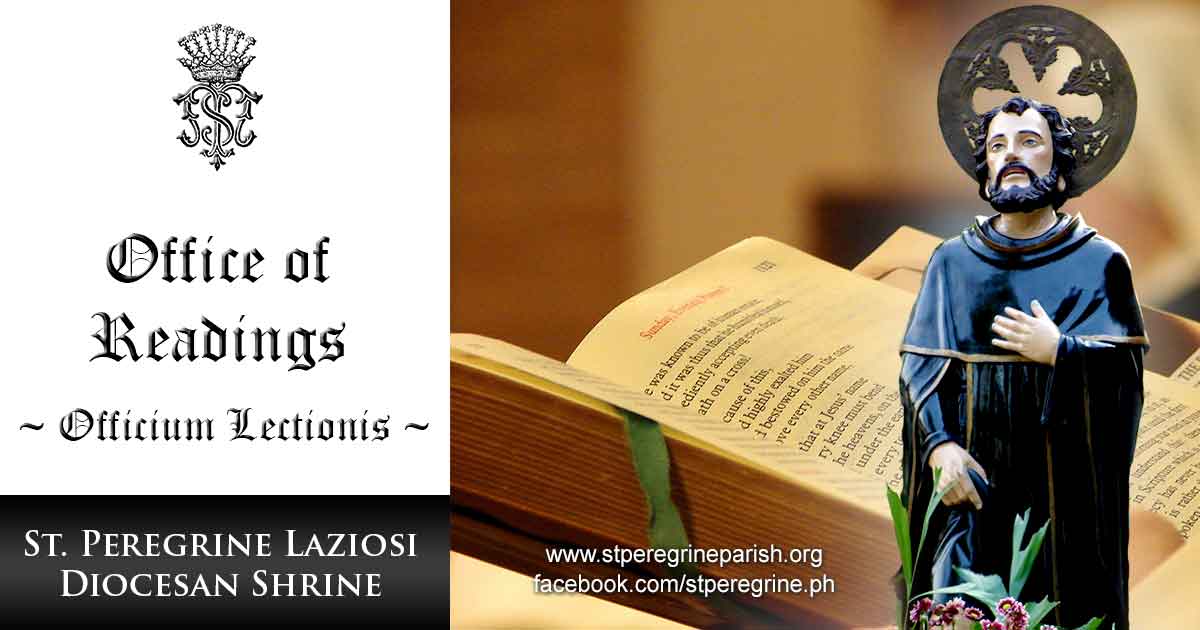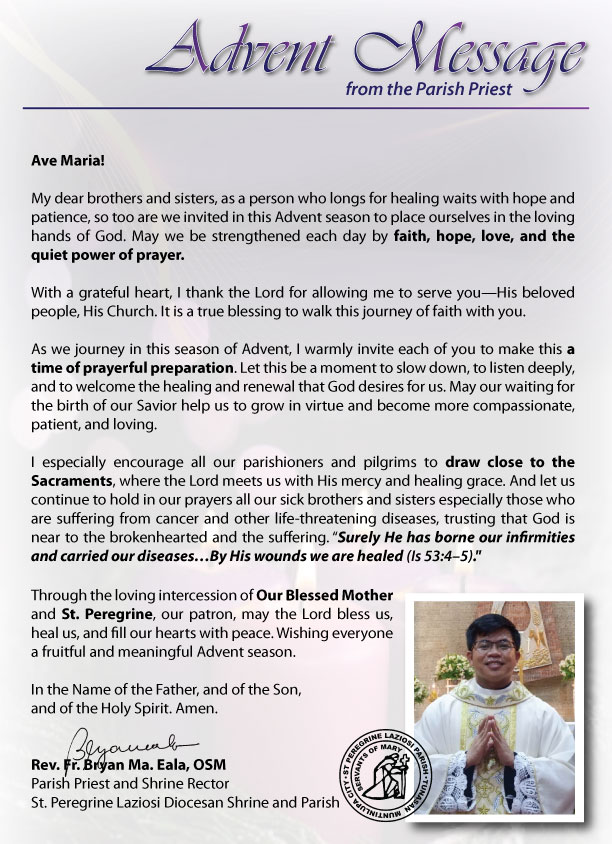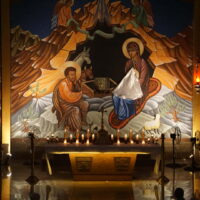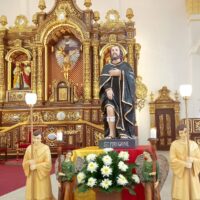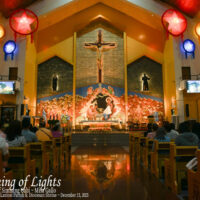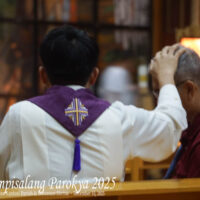Ribbon Placement:
Liturgy of the Hours Vol. II:
Ordinary: 1045
Proper of Seasons: 328
Psalter: Saturday, Week IV, 1606
Office of Readings for Saturday of the 4th week of Lent
God, come to my assistance.
— Lord, make haste to help me.
Glory to the Father, and to the Son, and to the Holy Spirit:
— as it was in the beginning, is now, and will be for ever. Amen.
HYMN
Ave Maria, gratia plena
Dominus tecum
Benedicta tu in mulieribus
Et benedictus fructus ventris tui, Jesus
Sancta Maria, Mater Dei
Ora pro nobis peccatoribus
Nunc et in hora mortis nostrae
Amen.
English Translation:
Hail Mary, full of grace
The Lord is with thee
Blessed are thou among women
Blessed is the fruit of thy womb, Jesus
Holy Mary, Mother of God
Pray for us sinners
Now, and at the hour of our death
Amen.
| 𝄞 | “Ave Maria” by Gretchen Harris • Title: Ave Maria (Chant); Album: Sing of Mary; Music; Plainsong mode I; vocal: Gretchen Harris; Used with permission; Visit and thank Gretch at http://www.gretchen-harris.com; Used by permission. |
PSALMODY
Ant. 1 The Lord delivered his people from the oppressor.
Psalm 78:40-72
Salvation history reveals the goodness of God and the faithlessness of his people
These events are recalled as a warning to us (1 Corinthians 10:6).
IV
How often they defied him in the wilderness
and caused him pain in the desert!
Yet again they put God to the test
and grieved the Holy One of Israel.
They did not remember his deeds
nor the day he saved them from the foe;
when he worked his miracles in Egypt,
his wonders in the plains of Zoan:
when he turned their rivers into blood,
made their streams impossible to drink.
He sent dog-flies against them to devour them
and swarms of frogs to molest them.
He gave their crops to the grub,
the fruit of their labor to the locust.
He destroyed their vines with hail,
their sycamore trees with frost.
He gave up their cattle to plague,
Their flocks and herds to pestilence.
He turned on them the heat of his anger,
fury, rage and havoc,
a troop of destroying angels.
He gave free course to his anger.
He did not spare them from death
but gave their lives to the plague.
He struck all the first born in Egypt,
the finest flower in the dwellings of Ham.
Glory to the Father, and to the Son, and to the Holy Spirit:
— as it was in the beginning, is now, and will be for ever. Amen.
Ant. The Lord delivered his people from the oppressor.
Ant. 2 The Lord led his people to his holy mountain.
V
Then he brought forth his people like sheep;
he guided his flock in the desert.
He led them safely with nothing to fear,
while the sea engulfed their foes.
So he brought them to his holy land,
to the mountain which his right hand had won.
He drove out the nations before them,
and divided the land for their heritage.
Their tents he gave as a dwelling
to each one of Israel’s tribes.
Still they put God to the proof and defied him;
they refused to obey the Most High.
They strayed, as faithless as their fathers,
like a bow on which the archer cannot count.
With their mountain shrines they angered him;
made him jealous with the idols they served.
God saw and was filled with fury:
he utterly rejected Israel.
He forsook his dwelling place in Shiloh,
the tent where he lived among men.
He gave his ark into captivity,
his glorious ark into the hands of the foe.
He gave up his people to the sword,
in his anger against his chosen ones.
So war devoured their young men,
their maidens had no wedding songs;
their priests fell by the sword
and their widows made no lament.
Glory to the Father, and to the Son, and to the Holy Spirit:
— as it was in the beginning, is now, and will be for ever. Amen.
Ant. The Lord led his people to his holy mountain.
Ant. 3 The Lord chose the tribe of Judah, and David, his servant, to shepherd Israel, his chosen people.
VI
Then the Lord awoke as if from sleep,
like a warrior overcome with wine.
He struck his foes from behind
and put them to everlasting shame.
He rejected the tent of Joseph;
he did not choose the tribe of Ephraim
but he chose the tribe of Judah,
the hill of Zion which he loves.
He built his shrine like the heavens,
or like the earth which he made firm for ever.
And he chose David his servant
and took him away from the sheepfolds.
From the care of the ewes he called him
to be shepherd of Jacob his people,
of Israel his own possession.
He tended them with blameless heart,
with discerning mind he led them.
Glory to the Father, and to the Son, and to the Holy Spirit:
— as it was in the beginning, is now, and will be for ever. Amen.
Psalm-prayer
For your people, Lord Jesus, you bring water from the rock and rain bread from heaven; you forgive sins with limitless generosity. Do not let us be marked by unfaithfulness, as in days of old, but grant that the covenant you sealed with your blood may merit us a place with you in your kingdom.
Ant. The Lord chose the tribe of Judah, and David, his servant, to shepherd Israel, his chosen people.
Sacred Silence (indicated by a bell) – a moment to reflect and receive in our hearts the full resonance of the voice of the Holy Spirit and to unite our personal prayer more closely with the word of God and public voice of the Church.
The man of God welcomes the light.
— So that all may see that his deeds are true.
READINGS
First reading
From the book of Numbers
20:1-13; 21:4-9
The waters of Meribah. The bronze serpent
The whole Israelite community arrived in the desert of Zin in the first month, and the people settled at Kadesh. It was here that Miriam died, and here that she was buried.
As the community had no water, they held a council against Moses and Aaron. The people contended with Moses, exclaiming, “Would that we too had perished with our kinsmen in the Lord’s presence! Why have you brought the Lord’s community into this desert where we and our livestock are dying? Why did you lead us out of Egypt, only to bring us to this wretched place which has neither grain nor figs nor vines nor pomegranates? Here there is not even water to drink!” But Moses and Aaron went away from the assembly to the entrance of the meeting tent, where they fell prostrate.
Then the glory of the Lord appeared to them, and the Lord said to Moses, “Take the staff and assemble the community, you and your brother Aaron, and in their presence order the rock to yield its waters. From the rock you shall bring forth water for the community and their livestock to drink.”
So Moses took the staff from its place before the Lord, as he was ordered. He and Aaron assembled the community in front of the rock, where he said to them, “Listen to me, you rebels! Are we to bring water for you out of this rock?” Then, raising his hand, Moses struck the rock twice with his staff, and water gushed out in abundance for the community and their livestock to drink.
But the Lord said to Moses and Aaron, “Because you were not faithful to me in showing forth my sanctity before the Israelites, you shall not lead this community into the land I will give them.”
These are the waters of Meribah, where the Israelites contended against the Lord, and where he revealed his sanctity among them.
From Mount Hor they set out on the Red Sea road, to bypass the land of Edom. But with their patience worn out by the journey, the people complained against God and Moses, “Why have you brought us up from Egypt to die in this desert, where there is no food or water? We are disgusted with this wretched food!”
In punishment the Lord sent among the people saraph serpents, which bit the people so that many of them died. Then the people came to Moses and said, “We have sinned in complaining against the Lord and you. Pray the Lord to take the serpents from us.” So Moses prayed for the people, and the Lord said to Moses, “Make a saraph and mount it on a pole, and if anyone who has been bitten looks at it, he will recover.” Moses accordingly made a bronze serpent and mounted it on a pole, and whenever anyone who had been bitten by a serpent looked at the bronze serpent, he recovered.
RESPONSORY John 3:14, 15, 17
As Moses lifted up the serpent in the desert, so the Son of Man must be lifted up,
— so that all who believe in him, may have eternal life.
God sent his Son into the world, not to condemn the world, but to save it.
— So that all who believe in him, may have eternal life.
Second reading
From the pastoral constitution on the Church in the modern world of the Second Vatican Council
All human activity is to find its purification in the paschal mystery
Holy Scripture, with which the experience of the ages is in agreement, teaches the human family that human progress, though it is a great blessing for man, brings with it a great temptation. When the scale of values is disturbed and evil becomes mixed with good, individuals and groups consider only their own interests, not those of others.
The result is that the world is not yet a home of true brotherhood, while the increased power of mankind already threatens to destroy the human race itself.
If it is asked how this unhappy state of affairs can be set right, Christians state their belief that all human activity, in daily jeopardy through pride and inordinate self-love, is to find its purification and its perfection in the cross and resurrection of Christ.
Man, redeemed by Christ and made a new creation in the Holy Spirit, can and must love the very things created by God. For he receives them from God, and sees and reveres them as coming from the hand of God.
As he gives thanks for them to his Benefactor, and uses and enjoys them in a spirit of poverty and freedom, he enters into true possession of the world, as one having nothing and possessing all things. For all things are yours, and you are Christ’s, and Christ is God’s.
The Word of God, through whom all things were made, himself became man and lived in the world of men. As perfect man he has entered into the history of the world, taking it up into himself and bringing it into unity as its head. He reveals to us that God is love, and at the same time teaches us that the fundamental law of human perfection, and therefore of the transformation of the world, is the new commandment of love.
He assures those who have faith in God’s love that the way of love is open to all men, and that the effort to restore universal brotherhood is not in vain. At the same time he warns us that this love is not to be sought after only in great things but also, and above all, in the ordinary circumstances of life.
He suffered death for us all, sinners as we are, and by his example he teaches us that we also have to carry that cross which the flesh and the world lay on the shoulders of those who strive for peace and justice.
Constituted as the Lord by his resurrection, Christ, to whom all power in heaven and on earth has been given, is still at work in the hearts of men through the power of his Spirit. Not only does he awaken in them a longing for the world to come, but by that very fact he also inspires, purifies and strengthens those generous desires by which the human family seeks to make its own life more human and to achieve the same goal for the whole world.
The gifts of the Spirit are manifold. He calls some to bear open witness to the longing for a dwelling place in heaven, and to keep this fresh in the minds of all mankind; he calls others to dedicate themselves to the service of men here on earth, preparing by this ministry the material for the kingdom of heaven.
Yet he makes all free, so that, by denying their love of self and taking up all earth’s resources into the life of man, all may reach out to the future, when humanity itself will become an offering acceptable to God.
RESPONSORY 2 Corinthians 5:15; Romans 4:25
Christ died for all,
— that those who live should no longer live for themselves but for him who died and rose again for their sake.
He was put to death for our sins, and raised to life to restore us to God’s friendship.
— That those who live should no longer live for themselves but for him who died and rose again for their sake.
CONCLUDING PRAYER
May the working of your mercy,
O Lord, we pray,
direct our hearts aright,
for without your grace
we cannot find favor in your sight.
Through our Lord Jesus Christ, your Son,
who lives and reigns with you in the unity of the Holy Spirit,
God, for ever and ever.
— Amen.
ACCLAMATION (at least in the communal celebration)
Let us praise the Lord.
— And give him thanks.
The English translation of The Liturgy of the Hours (Four Volumes) ©1974,
International Commission on English in the Liturgy
Corporation. Readings and Old and New Testament Canticles (except the Gospel Canticles) are from the New American Bible
© 1970 Confraternity of Christian Doctrine, Washington, D.C.. Used with permission. All rights reserved.
The DivineOffice.org website, podcast, apps and all related media follows the liturgical calendar for the United States.
The 1970 edition of the New American Bible as published in the Liturgy of the Hours is approved for use
only in the United States. DivineOffice.org website, podcast, apps and all related media is © 2006-2021
Surgeworks, Inc. All rights reserved.
 Diocese of Parañaque
Diocese of Parañaque

